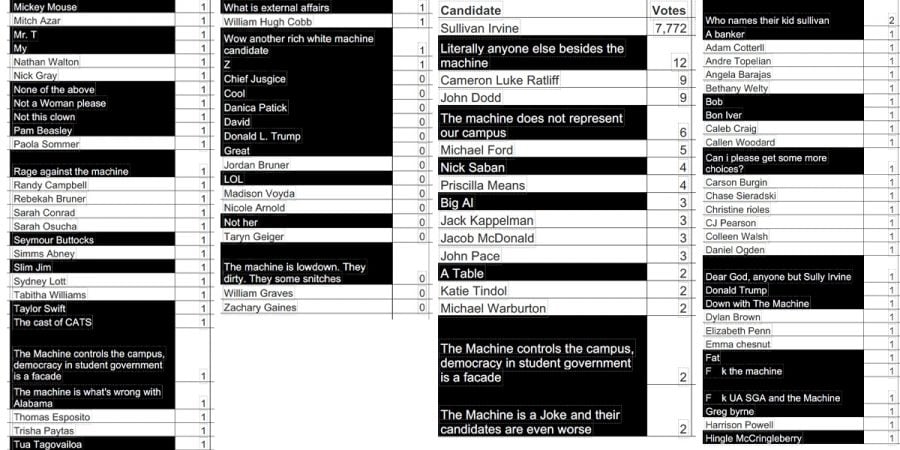‘Anyone but the Machine’: Read the full SGA election results here
The SGA Elections Board redacted 93 mentions of the Machine from this year’s write-in results.
March 8, 2021
As a notably under-contested Student Government Association (SGA) campaign week came to a close, some students chose to air their grievances at the virtual ballot box.
This year, one student wrote in a vote for barbecue legend Mr. Tee, while another backed a beloved Raising Cane’s employee. Others waged their support for Jesus Christ, Joe Exotic and “Prince McMuffin,” in reference to 2018 SGA President Price McGiffert. And then, there were the 93 mentions of the Machine, a not-so-secret organization that has controlled student government elections for decades.
But none of those entries are visible on the SGA’s official election results webpage.
The SGA Elections Board redacted more than 400 write-in entries from the unofficial election results released hours after voting closed on Tuesday evening, impacting a total of 574 write-in votes across all executive and senate races. More than one-third of all redacted votes mentioned the Machine.
UA SGA held elections yesterday with all of the executive positions unopposed. The unofficial results are posted online, and 400+ of the write in votes are blacked out. I've edited the color of the text in Adobe Acrobat to reveal what lies underneath the black boxes (1/5): pic.twitter.com/nohmK2NSsZ
— Hannah Saad (@ByHannahSaad) March 3, 2021
This is the second year in a row that the Elections Board has attempted to conceal write-in votes. Last year, it took a petition for the Board to reveal the results in full. But this year, students could simply download and edit the published file to reveal its blacked-out text.
History of Redactions
In the past, historical election data wasn’t publicly accessible on the SGA website. So in 2019, the SGA passed a constitutional amendment, authored by former independent Senator Bennett McGehee, requiring the Elections Board to post results in full after every election and to task a webmaster with maintaining that data. McGehee’s purpose in writing the amendment, he said, was to provide students with “an accurate history of voting on the SGA website.”
That included preserving old write-in votes for the public to see.
But when 2020 rolled around and a notably under-contested SGA race brought voter turnout to a new low, the Elections Board abandoned its newfound practice of publishing election results in full.
The published results, which redacted some write-in commentary, drew criticism from former independent Senator Jack Kappelman, who filed an appeal with the SGA Judicial Board to release the complete election results.
Kappelman said recent independent candidates have often relied on publicly available voting totals to plan their campaigns. But without the full data, Kappelman couldn’t determine whether there were enough write-in results to overturn the election – and he questioned how students could trust a body of Elections Board members, most of whom are members of Greek organizations, to verify the results.
“We just blindly trust that this incredibly biased body is in fact reporting the truth, so that when they report the half-truths, how do we know that the redactions aren’t also altering the vote totals and percentages?” Kappelman said.
Shortly after Kappelman filed the appeal, the Board released a statement reasoning that “some of the write-in votes on the election ballot could be seen as slanderous, not respectful, and/or not promoting equity and inclusion,” but announced it would add the full write-in results back to the web page, prompting Kappelman to drop the suit.
The Board’s statement also cited a part of the SGA Constitution that states that write-in candidates “must meet the minimum certification qualifications set for candidates whose names appear on the ballot.” The constitution does not outline any process for omitting an ineligible write-in candidate from the election results.
For Kappelman, the criteria seemed arbitrary: If the goal was to purge non-students from the results, then why did head football coach Nick Saban and then-U.S. President Donald Trump make the cut? (This year, entries for Saban and Trump were redacted, but segregationist and former U.S. Senator Strom Thurmond and convicted fraudster Bernie Madoff were kept public).
The full results didn’t stay online for long.
Administrators Chime In
Some entries in the full Spring 2020 write-in results – which can now only be found through a web archive – alarmed Elections Board staff advisors, who approached Myron Pope, the University’s newly-hired vice president for student life, and other administrators with their concerns. Pope ultimately approved a new version of the Elections Board manual, which added a stipulation that “write-in votes that display discriminatory or harassing remarks will be omitted from the unofficial and official results, as this is a violation of Offenses against Persons,” which are outlined in the UA Student Code of Conduct.
Kappelman said he had encouraged the change last year to redact discriminatory language from write-in results, but in conversations with staff, he stressed that anti-Machine write-ins did not fall under that category and should be preserved.
This year the Elections Board redacted four discriminatory write-in entries and about 20 results that targeted individuals, compared to the 93 Machine entries. The board also redacted five entries for current students. All other redacted entries were for non-students.
Pope said the change to omit some write-in entries from future election results, including nearly 100 entries related to the Machine this year, was not meant to cover up anything.
“That was a change that I encouraged because it was irrelevant,” Pope said. “Yes, there are some things that are related to the Machine, but, you know, there are other things there that, again, are not necessarily appropriate and sometimes irrelevant. It’s about focusing on people who are truly eligible to serve the student body. That’s what those redactions were about.”
Pope said his major concern about this election cycle was that few students decided to run for office. And while he said he’s been working with SGA leaders and advisors to strengthen their outreach efforts, he said that many students still weren’t interested or were too busy to get involved – a problem that he said stemmed from “a lack of knowledge about the process.”
“I would like for students not to feel apathetic in any way toward this process,” he said. “I want them to think about ways in which they can engage and be involved in the process.”
Compared to the most recent contested presidential race in 2019, this election saw a 34% decrease in the number of votes cast for president. The SGA Elections Board called this year’s turnout of nearly 9,000 a “success” and said they counted all votes and administered results in a manner that was “in line with the Elections Board Manual,” according to a statement given to The CW on Friday.
“The goal of the SGA Elections Board is to ensure honest, fair and open elections for all,” the statement read. “We believe that was achieved by holding all candidates to the highest level of accountability.”
McGehee, who is now a UA alumnus, acknowledged that the amendment he authored two years ago could have had clearer language to address entries that targeted individuals or used discriminatory terms. But for the sake of free speech and preserving voting records, he said other entries – including those that mention the Machine – should still be made public.
“Derogatory language has no place in what is being published on the University websites, but language that doesn’t fall under that category… people should still be able to say those things,” he said.
Read the Write-Ins
With the help of a basic PDF editor, we restored the document to show the redacted text. We kept some discriminatory entries blacked out and censored explicit language for the more sensible among us.
Noteworthy non-redacted write-ins:
- Bon Iver, American Indie band (1 vote for President)
- Deez Nuts (1 vote for Executive Vice President)
- Harry Cox (1 vote for Executive Vice President)
- Sheev Palpatine, “Star Wars” villain (1 vote for Executive Vice President)
- Agatha Harkness, “WandaVision” character (1 vote for Executive Secretary)
- Strom Thurmond, former U.S. Senator who pushed for segregation (1 vote for Executive Secretary)
- Hank Williams, country musician (1 vote for VP Academic Affairs)
- Mia Thermopolis,“The Princess Diaries” character (1 vote for VP of Academic Affairs)
- Olivia Jade, YouTuber (1 vote for VP of Academic Affairs)
- Jerry Jones, Owner of the Dallas Cowboys (1 vote for VP of External Affairs)
- Bernie Madoff, former financial advisor convicted of crimes related to running the largest Ponzi Scheme in world history (written in, but 0 votes for VP of Financial Affairs)
A number of Gump Twitter personalities also made the cut, with senior Luke Ratliff receiving a total of 136 votes across all positions. Ratliff also had write-ins under Cameron Luke Ratliff and nickname “Fluffopotamus,” which was redacted. The most write-ins in a single race were for Cullen Copeland in the presidential election, who received a total of 73 votes (including one redacted result under “@Cullen Copeland”).
Read the (mostly) full results below.





















